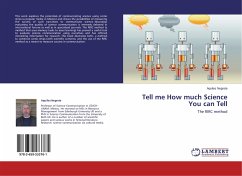The average person tells at least six lies a day - is it any wonder we struggle to sort fact from fiction in the modern world? Thanks to remarkable increases in the speed and ease of information sharing, the ability to critically judge the integrity of information around us is more necessary now than ever before. Luckily, it is possible for any individual to evaluate information in a much more critical fashion, based largely upon a simple process of deductive reasoning. This book explores the elements of truth and fiction across the expanse of our daily lives. Through examination of public figures and members of popular culture who have been caught in the act of deception, the reader is encouraged to consider what information can best be used to judge the legitimacy of any event, as well as considering our own culpability in perpetuating a culture of deceit. From the evolution of deception to the private fictions we tell ourselves, this book will guide the reader to a new perspective on the role of lying in modern society. Like Dan Ariely and Daniel Kahneman have opened our eyes to the fallibility of human judgment, Lori Badura opens our eyes to the psychological and social mechanisms that enable humans to distort the truth both consciously and unconsciously." Daryl Wansink, PhD (social psychologist) Tell It Like It Isn't is a fresh voice in the increasing debate surrounding the growing prevalence, impact, and tolerance of deception. She has brilliantly elevated the discussion to the level of our society, allowing us to consider the deceptive individual within the context of their environment. In my experience, it is rare to find psychological theory presented so clearly and compellingly. John C. Parker, PhD (social psychologist)
Hinweis: Dieser Artikel kann nur an eine deutsche Lieferadresse ausgeliefert werden.
Hinweis: Dieser Artikel kann nur an eine deutsche Lieferadresse ausgeliefert werden.








